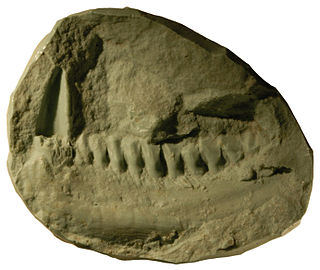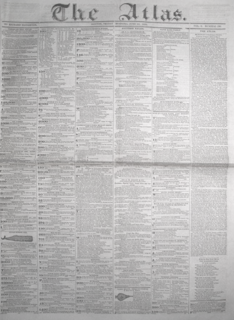
Haughton is a town in Bossier Parish, Louisiana, United States. The population was 3,454 at the 2010 census. It is part of the Shreveport–Bossier City Metropolitan Statistical Area.
William Haughton was an English playwright in the age of English Renaissance theatre.

Devon Island is an island in Canada and the largest uninhabited island on Earth. It is located in Baffin Bay, Qikiqtaaluk Region, Nunavut, Canada. It is one of the larger members of the Canadian Arctic Archipelago, the second-largest of the Queen Elizabeth Islands, Canada's sixth-largest island, and the 27th-largest island in the world. It comprises 55,247 km2 (21,331 sq mi) of Precambrian gneiss and Paleozoic siltstones and shales. The highest point is the Devon Ice Cap at 1,920 m (6,300 ft) which is part of the Arctic Cordillera. Devon Island contains several small mountain ranges, such as the Treuter Mountains, Haddington Range and the Cunningham Mountains. The notable similarity of its surface to that of Mars has attracted interest from scientists.

Haughton impact crater is located on Devon Island, Nunavut in far northern Canada. It is about 23 km (14 mi) in diameter and formed about 39 million years ago during the late Eocene. The impacting object is estimated to have been approximately 2 km (1.2 mi) in diameter. Devon Island itself is composed of Paleozoic shale and siltstone overlying gneissic bedrock. When the crater formed, the shale and siltstone were peeled back to expose the basement; material from as deep as 1,700 m (5,600 ft) has been identified.

Haughton Green is a large village in Tameside, Greater Manchester, England. It formed part of the ancient township of Haughton, Lancashire, along with Haughton Dale, Higher Haughton, Lower Haughton, Haughton Hall and Haughton itself.
Gregory "Greg" Haughton is a Jamaican 400 metres runner. He won three Olympic medals, one at the 1996 Summer Olympics and two at the 2000 Summer Olympics. His personal best for the 400 m was 44.56 seconds.

Haughton is a village and civil parish which lies northwest of Nantwich in the unitary authority of Cheshire East and the ceremonial county of Cheshire, England. According to the 2001 Census, its population was 223, reducing to 204 at the 2011 Census, and has four fully active farms.

Lycorhinus is a genus of heterodontosaurid ornithischian dinosaur hailing from the Early Jurassic strata of the Elliot Formation located in the Cape Province, South Africa.

Gould Island lies east of Conanicut Island in Narragansett Bay in the U.S. state of Rhode Island. It is a part of the town of Jamestown, Rhode Island, and has a land area of 55.3 acres (22.4 ha).

Percy Duncan Haughton was an American football and baseball player and coach. He served as head football coach at Cornell University from 1899 to 1900, at Harvard University from 1908 to 1916, and at Columbia University from 1923 to 1924, compiling a career college football record of 97–17–6. The Harvard Crimson claimed national champions for three of the seasons that Haughton coached: 1910, 1912, and 1913. Haughton was also Harvard's head baseball coach in 1915 and part owner of the Boston Braves from 1916 to 1918. He was inducted into the College Football Hall of Fame as a coach in 1951.
Haughton Halt was a minor station located north of Shrewsbury on the GWR’s Paddington to Birkenhead main line. It was opened in the nineteen thirties as part of the GWR's halt construction programme, aimed at combatting growing competition from bus services and would primarily have served the adjacent Haughton Airfield. Today the route is part of the Shrewsbury to Chester line. Nothing now remains on the site.
Hampden was a parliamentary electorate in the Otago region of New Zealand, from 1861 to 1870. The electorate was centred on the town of Hampden.

Macroscelesaurus is an extinct genus of therocephalian therapsid from the Late Permian of South Africa. The type species Macroscelesaurus janseni was named by Sidney H. Haughton in 1918 from the Cistecephalus Assemblage Zone. It is one of the few therocephalians known from postcranial remains.

Brass Shout is an album by trumpeter Art Farmer, featuring a brass ensemble arranged and conducted by Benny Golson. Recorded in 1959, the album was originally released on the United Artists label.
Frédéric Anton is a French chef, Meilleur Ouvrier de France and three stars at the Guide Michelin since 2007. He is currently the chef of the restaurant Le Pré Catelan in Paris.
The 1915 Harvard Crimson football team represented Harvard University in the 1915 college football season. The Crimson finished with an 8–1 record under eighth-year head coach Percy Haughton. The sole loss was a 10–0 defeat against Cornell. Walter Camp selected three Harvard players as first-team members of his 1915 College Football All-America Team.

The Haughton River is a river located in North Queensland, Australia.
A by-election was held in the Gold Fields electorate on 29 May 1865. The by-election was won by Charles Edward Haughton, who defeated two other candidates.

Upper Haughton is a locality in the Shire of Burdekin, Queensland, Australia. In the 2016 census, Upper Haughton had a population of 75 people.













